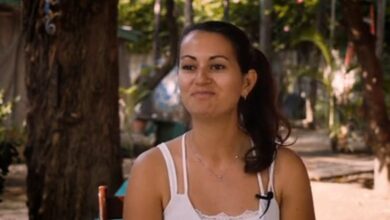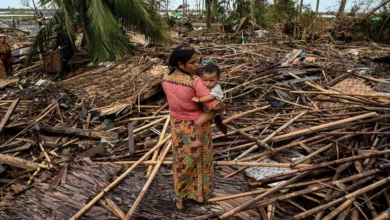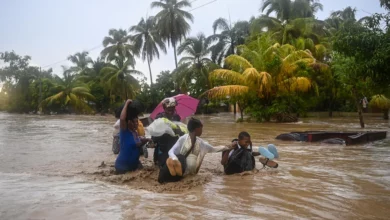International donors on Wednesday pledged US$5.3 billion to Haiti, exceeding expectations in a worldwide drive to rebuild the country after January’s shattering earthquake.
Ban told reporters at the end of a one-day donors conference at UN headquarters that the pledges were "far beyond expectations." The world body had hoped to raise US$3.9 billion at the conference to help the impoverished Caribbean nation over the next two years.
Some 120 countries also made a total longer-term commitment of some US$9 billion, a figure that includes the US$5.3 billion in shorter term aid. "This is the down payment Haiti needs for wholesale national renewal. It is the way to build back better," Ban said.
Ban had called for quick donations in response to a UN request for US$1.4 billion in immediate humanitarian assistance for Haiti, which even before the 12 January earthquake was the poorest country in the western hemisphere.
So far, the request has only been half funded, fueling fears that the rainy season will compound the disaster for some 1.2 million Haitians left homeless by the disaster.
US Secretary of State Hillary Clinton, co-host of Wednesday’s meeting, said the United States would pledge US$1.15 billion for long-term recovery, which she said must be planned and executed by Haiti’s government.
"Aid is important but aid has never saved a country. Our goal must be the empowerment of the Haitian people. They’re the ones who will carry on the work of rebuilding Haiti long after our involvement has ended," she said.
Clinton was joined at the meeting by her husband, former US President Bill Clinton, the UN special envoy for Haiti who will coordinate relief efforts for the country.
A Haitian plan
The UN meeting seeks to raise funds for a Haitian government recovery plan that includes decentralizing the economy to create jobs and wealth outside Port-au-Prince, the capital of some four million people.
Haitian President Rene Preval thanked donors and told reporters his country "must take advantage of this opportunity that we now have."
"I appeal to my fellow Haitians to understand the effort that has now been made by the international community and the responsibility that we now have in the interests of our country to respond rapidly and appropriately," Preval said.
Haitian Prime Minister Jean-Max Bellerive said his government, which saw all but one of its ministries destroyed, had a vision for Haiti’s future but needed urgent help.
Aid agencies say the task is huge. Haiti suffered as many as 300,000 people killed in the magnitude 7.0 earthquake, which crippled the government and caused damage estimated at between US$8 and US$14 billion.
Ban said the United Nations would use an internet-based system to track whether the funds were being spent as agreed.
In the crowded, squalid quake survivors’ camps of Port-au-Prince, thousands clamored for basic necessities. Overnight rains soaked fragile shelters and turned dusty alleyways to mud.
"We need water, food, toilets, healthcare, light and tents — shelter," said Silverin Nono, the leader of a camp that has mushroomed across a barren, garbage-strewn hillside called Bas-Canaan north of the city.
International aid agency Oxfam said although the total funding pledged was impressive, countries must ensure it is new money, "not recycled money taken from other humanitarian crises."
"The poor and vulnerable of other disasters should not be paying for this," said Oxfam spokesman Philippe Mathieu.
International Monetary Fund Managing Director Dominique Strauss-Kahn said that if the world community fulfills its pledges, Haiti’s economy could grow at an average eight percent in coming years–almost 50 percent faster than under previous IMF forecasts.
"That’s possible, but condition one is to have the Haitian authorities really in the driver’s seat," he told reporters.




